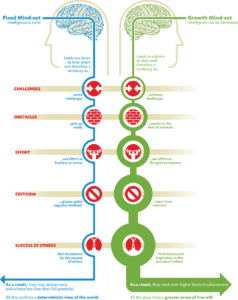How Growth Mindset Cultivates Marketing Success

By Matthew Lallas, Marketing and Sales Intern
For many, growth mindset is likely a buzzword that you hear quite a bit. A utopian idea that if someone is simply “open-minded” to learning and growth, they’ll become radically more successful or productive.
While this pop culture view of the practice holds some elements of truth, the reality of growth mindset is much more nuanced, and even has specific applications within marketing organizations. I’ll outline here what growth mindset actually is, how to cultivate it, and how that might look within a marketing environment.
What Is Growth Mindset?

Infographic by Nigel Holmes
Growth mindset fits into a model of mindset research conducted and popularized by Carol Dweck. Her proposal: that we oscillate between both a growth and fixed mindset. In her book, “Mindset: The New Psychology of Success,” Dweck offers that our most basic and closely held beliefs affect how we measure success and failure, and in turn, shape the type of mindset within our personality.
Take for example a scenario in which two people, each with a significant commitment to their respective mindsets, are faced with the same set of challenges, obstacles, criticisms, and successes of others. Take a look at the infographic for a visual representation of this hypothetical (click to enlarge). For someone more entrenched in a fixed mindset, both challenges and obstacles are tell-tale signs to give up or avoid the situation. For someone committed to a growth mindset, challenges are embraced as critical opportunities for learning and improvement, and obstacles are understood as inevitable and therefore persisted through.
In the cases of criticism and the success of others, those with a fixed mindset will likely be threatened by these supposed attacks to either their intelligence, ability, or personal success. This can ultimately lead to an inability to accept criticism and a general resentment of anyone who is successful. For those with a growth mindset, any negative criticism that is productive is important in refining oneself, and the success of others is helpful in terms of the lessons that it provides or even validating for someone hoping to achieve a similar level of success. It should be noted here that “success” in this context is highly dependent on the individual. It can even be a side-effect of growth mindset to imagine success with more complexity and outside of a myopic definition.
Growth Mindset in Practice
In her work, Dweck often uses instances of self-talk in proposing what each mindset might look like in practice. For example, in “Mindset,” she writes: “I’ve seen so many people with this one consuming goal of proving themselves— in the classroom, in their careers, and in their relationships. Every situation calls for a confirmation of their intelligence, personality, or character. Every situation is evaluated: Will I succeed or fail? Will I look smart or dumb? Will I be accepted or rejected? Will I feel like a winner or a loser?” For someone particularly set in fixed mindset, every situation or decision begins to feel like a test. In specific, a monumental test that not only confirms one’s current abilities, but all of their potential for future success, too.
Conversely, growth mindset in practice is focused on opportunities for improvement and development off of what has already been established, versus attempting to take only your current skills into every “test” of life. Dweck on this points explains in “Mindset”: “There’s another mindset in which these traits are not simply a hand you’re dealt and have to live with […] In this mindset, the hand you’re dealt is just the starting point for development. This growth mindset is based on the belief that your basic qualities are things you can cultivate through your efforts.” This mindset relies on honesty about your current strengths and weaknesses (and not simply the “weaknesses” portrayed in job interviews).
Though, as growth mindset has become a more popular concept in personal and professional development advice, Dweck’s research has begun to develop some commonly held misconceptions. In an article for the Harvard Business Review, Dweck identifies some of these key missteps. One, she writes, is believing that “A growth mindset is just about praising and rewarding effort.” Especially in the business context, this is an incorrect assumption. As Dweck points out, “outcomes matter”. While this doesn’t mean only rewarding the efforts that happen to be successful, continuing to engage in unproductive activity in the name of growth mindset is not a good strategy. Instead, one should be willing to try what works and what doesn’t and reward the lessons and learning that inevitably happen along the way.
Another misconception is: “Just espouse a growth mindset, and good things will happen.” Simply stating that growth mindset is important can’t bring any increases in success, unfortunately. Without creating the necessary time and space for learning, risk-taking, and constructive criticism, the goal of a growth mindset can quickly fall flat.
Marketing Applications
1. Keep Learning
As the tools, tactics, and conditions of marketing keep changing, it’s important to also keep up the pace of learning. So, while you won’t immediately catch onto every new change (whether on an industry or organizational level), continuing to hone your skills, breadth of knowledge, and willingness to learn is a huge step in integrating more of a growth mindset in marketing.
This process can look different for each person. For some, learning may happen naturally on the job: continually solving problems and learning better strategies to deal with similar challenges in the future. However, if you don’t feel as though the same level of “natural” learning is taking place, or if you’re interested in learning skills that are outside of your day-to-day functions, it can be helpful to set aside time to intentionally focus on learning new, relevant skills to continue developing your ever-growing “hand of cards.”
2. Reevaluate and Iterate Systems and Tactics
So, while it can be unproductive to “fix” something that isn’t in need of major development, continuing to imagine new and better solutions to the same sorts of problems is a great way into growth mindset within marketing. Every organization is comprised of complex, intertwining systems that all use different tactics to achieve solutions. So, understanding both the pain points and opportunities for reevaluation (no matter how small) within each system is vital. Acknowledging that methodology itself is not static is also a part of growth mindset. So, instead of finding ways to avoid persistent obstacles, continuing to iterate and develop the given system both improves its success and your own skillset.
3. Understand and Prepare for Change
Much of the conditions around marketing are bound by change. Consumer needs, habits, and psychology change. In-demand services and resources change. The tools, programs, and methods of marketing change. By understanding deeper the inherently variable aspects of marketing, both navigating and developing off of brand-new changes becomes easier and less jarring.
Holding a growth mindset is rarely easy. It’s a practice that takes time, effort, and continual reframing. Though ultimately, the potential that is unlocked through seeing both your own and an organization’s behavior as dynamic and improvable delivers a much higher, more sustainable rate of success.
What are your own experiences with growth mindset? Let us know in the comments.





